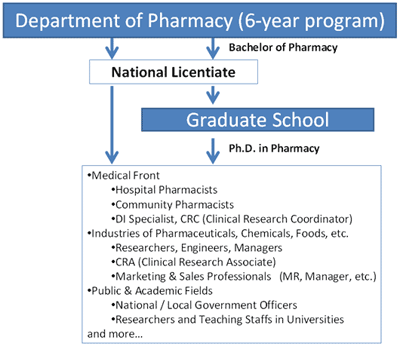Nurturing Pharmacists who Work in a Medical Team Treating Patients as its Top Priority
The 'Model Core Curriculum for Pharmaceutical Education' proposed by the Pharmaceutical Society of Japan is basically applied to the education at the Department of Pharmacy. Through the curriculum, students are nurtured to acquire necessary knowledge for proper use of medication and can have the capability to update it with progress of medical science, and they can actively work in a medical team treating patients as its top priority.
In order to fulfill the aim of nurturing human resources who not only have pharmaceutical expertise but also can put themselves into patients' shoes, education on humanism, communication skills and medical ethics is comprehensively provided.
In the first year, students learn bioethics through the practice of small group learning (SGL). An appropriate attitude as a medical professional will be instilled into the students as a result of affirming the dignity of human life and learning presentation skills. Additionally, basic achievement of science such as biology, chemistry and physics will be developed in preparation for specialist courses. Students in the second and third year mainly take the subjects specialized for pharmaceutical professionals as the core scientific grounding necessary for pharmacists. In the fourth year, integrated medical seminars focusing on pharmaceutical care and advanced trainings for hospital and pharmacy practices are prepared. A part of the pharmacy training is carried out at the University Community Pharmacy within the campus. Students in the fifth year are given an opportunity to participate in hands-on clinical sessions at full scale hospitals and pharmacies for two and a half months each and also attend lectures related to advanced medical care, such as life sciences and drug development.
During this year, in addition, in order to enhance the problem-solving ability, each student belongs to a laboratory and undertakes a final research project as integration of experiences and expertise that he/she has gained. Moreover, language skill that helps him/her be active in the global society is developed.
Learning Humanism
In the small group learning (SGL), students' awareness of being a professional engaging in life will be fostered and an appropriate attitude as a medical professional will be adopted. Students are expected to gather information regarding themes, such as sanctity of life, spirits as a leader in medical care and establishment of trust relationship, to debate, to create products and to make a presentation. Through the process of SGL students' communication skills and presentation skills will also be developed.
Introduction to Pharmacy
There are lectures and on-site training that aim at inspiring students to improve their motivation as a future pharmacist and to encourage them to comprehend a role and a mission pharmacy in society. Students are given experience in a work site where pharmacists are active as well as lectures about history of pharmacy, areas pharmacists actively take part in, interface between today's society and pharmacy, and more.
Preparatory Education of Pharmacy
In accordance with the "Model Core Curriculum for Pharmaceutical Education" issued by the Pharmaceuitical Society of Japan, students are requested to take classes of liberal arts such as social sciences, and languages and culture, so that they become sophisticated professionals in healthcare services. Students learn these disciplines together with those in other schools and faculties at Keio's Hiyoshi Campus.
Education Specialized in Pharmacy and Pharmaceutical Sciences
In addition to the introductory education program, students study the fundamental and necessary sciences for health, environment and drugs, jointly with students of the Department of Pharmaceutical Sciences, such as life sciences, organic chemistry, physical chemistry, analytical chemistry, natural products chemistry, etc. The programs specific to the Faculty and included in the curriculum are health and environment, mode of drug action, pharmacotherapeutics, interaction of drug and society, etc.
Practical On-Site Pharmacy Training
Before moving on to on-site training, students attend lectures and practical works held in facilities within the Faculty such as Keio University Community Pharmacy, the Sterile Product Laboratory.
On-site pharmacy practice trainings are provided at contracted hospitals and Keio University Hospital (clerkship), and neighbourhood community pharmacies for two and a half months each.
Research Work for Graduation and Advanced Education
Each student belongs to a research laboratory and makes a final research work before graduation. Through this work, students' problem-solving ability is bolstered. Also, following Model Core Curriculum for Pharmaceutical Education, there is an opportunity for students to take more advanced lectures and practical clinic training.
Career Prospects
The pass rate for the national examination for pharmacists among students of the Department of Pharmacy is consistently high. Nonetheless, students do not consider passing the examination or obtaining certification to be their final goal, but rather a milestone along their journey to a wide range of careers. Naturally, major employers of our graduates are hospitals and pharmacies, but also include pharmaceutical companies, public institutions (such as the Ministry of Health, Labour and Welfare), and chemical, food, and cosmetics companies.
Additionally, graduates complete the program as pharmaceutical scientists, combining the certification of a pharmacist equipped with medical expertise and the Ph.D. (in pharmacy) as a researcher, opening avenues to actively succeed in the increasingly globalized fields of medicine and pharmaceutical research and development. Students at the Faculty of Pharmaceutical Sciences at Keio University are strongly encouraged to enter the doctoral program.



